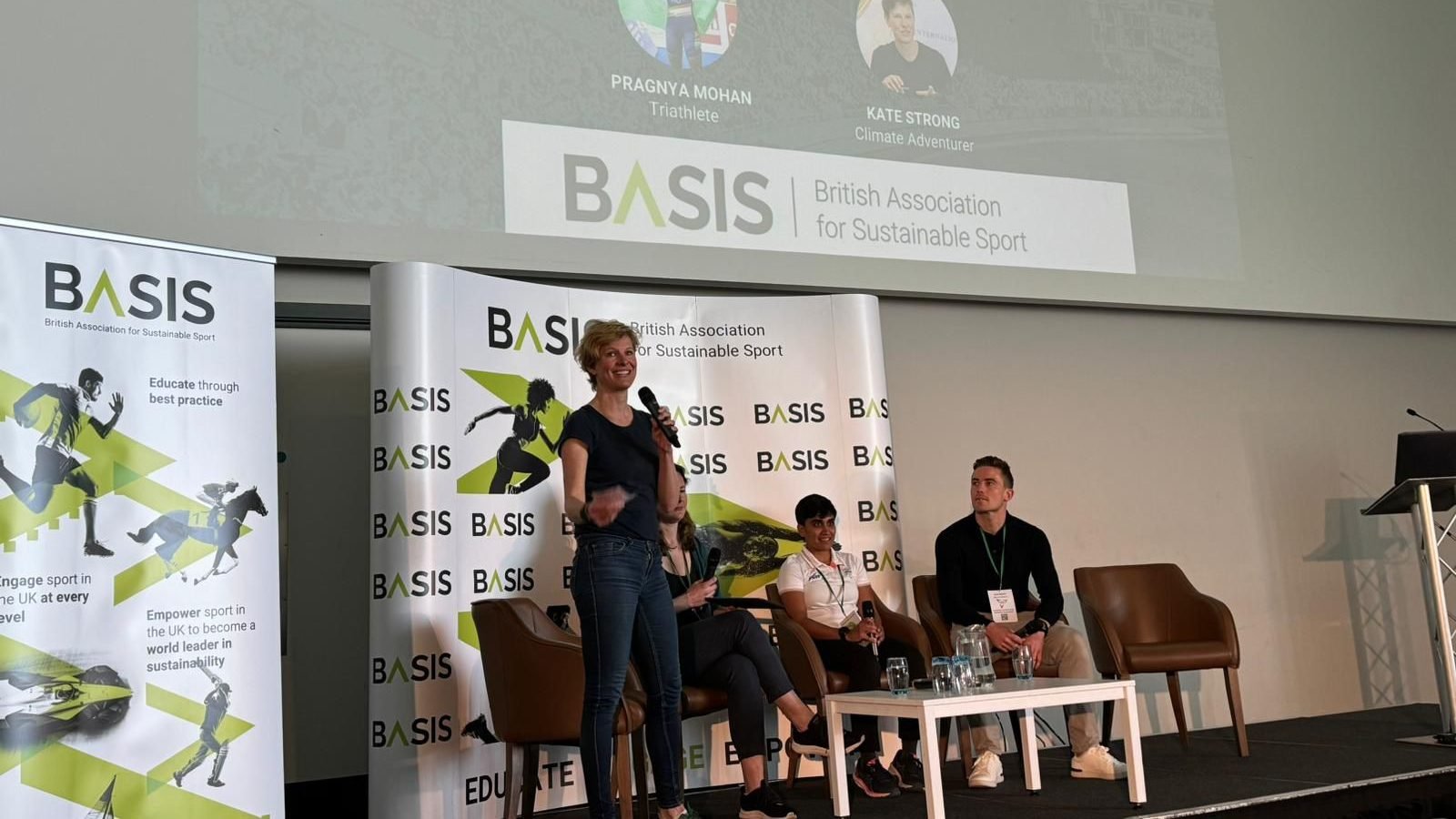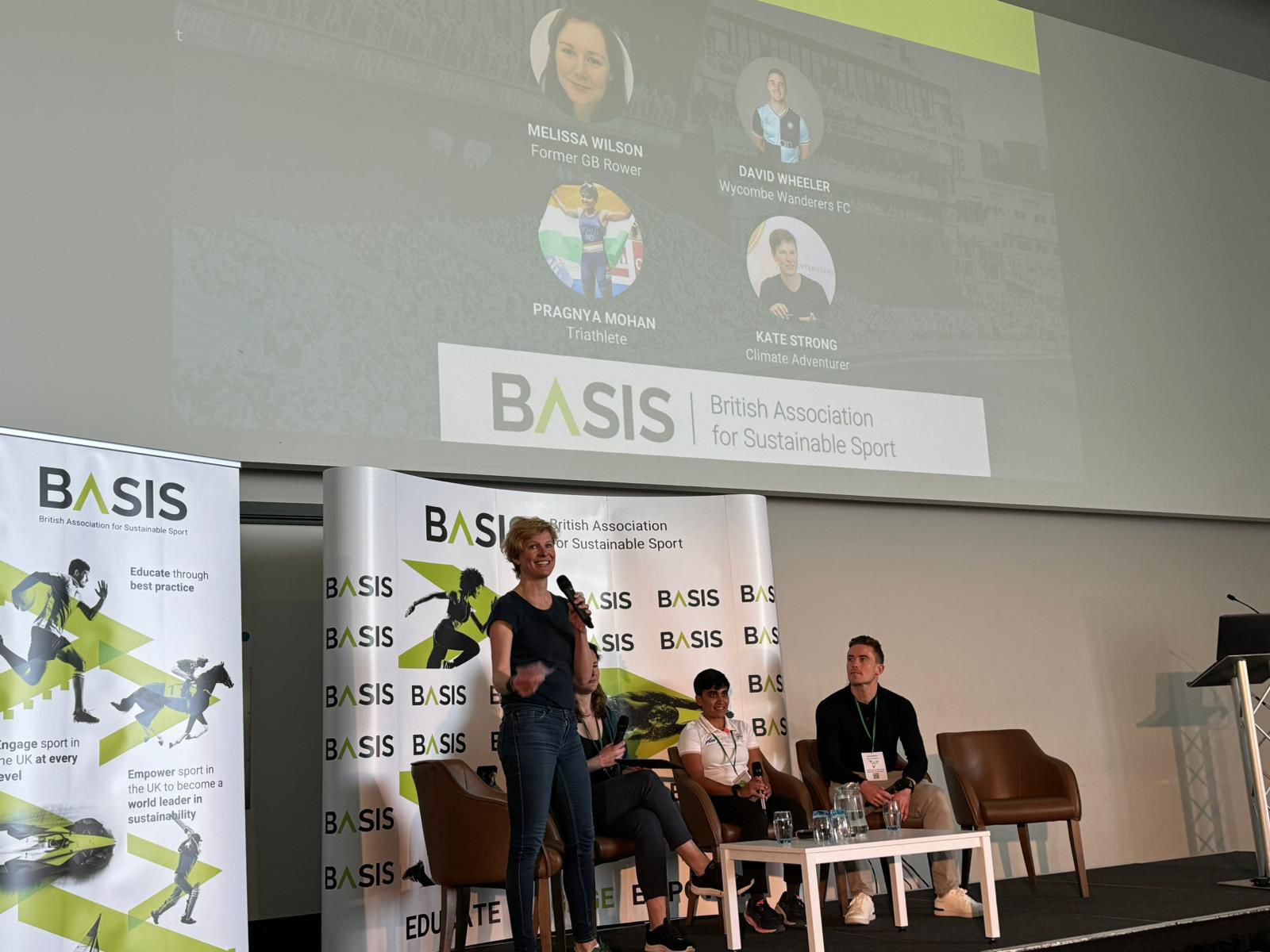by Kate Strong
The British Association for Sustainable Sport hosted their annual conference in Old Trafford Cricket Ground in Manchester at the end of Apri.
“Not another conference talking about sustainability within the sport sector,” I hear you say. To be honest, I felt the same when I read through the list of over 200 delegates attending. I recognised names I typically see at many other conferences and I mused (rather cynically) whether we would spend the time together patting each other on the back for a good report, rather than addressing the urgent action required within the sporting sector to protect the future of sport and the world at large.
I had been invited to host the Athlete panel, and with nine panels on the same day I knew that we needed to inject some energy and make a powerful impression to ensure we were heard and people instigated change from what we shared. The panel didn’t disappoint, and below are some key takeaways from from the BASIS Conference.

We have passed the tipping point
Did you know that the world’s average temperature has been sitting above +1.5C since August 2023?
I didn’t.
Seán McCabe, from Ireland’s Bohemian FC ,sums it up: “We’re drawing 1-1 in a pre-season friendly and we’re celebrating it like we’ve won the title.”
Pragnya Mohan, Indian Triathlete and founder of the social enterprise Ek Beti Ek Cycle shared how this temperature increase impacts sport as well as her home city of Ahmedabad. For eight months of the year, she’s unable to train past 8am because the daily temperature has already exceeded 40C. Even though she’s India’s highest ranked triathlete, she has never swum in open water in her state of Gujarat because the water pollution is too high.
With predictions of up to 20% of Olympic and Paralympic nations being unable to compete due to the climate crisis, Pragnya’s experience only magnifies the inequitable impact the crisis is having on our sport and beyond.
Britain’s sport is also at risk
Chris Boardman MBE, Chair of Sport England, highlighted that we lose 120,000 games a year due to unusable pitches, with these games being primarily for youth and grassroots projects.
The extreme weather conditions of unseasonal rain, flooding and exceptional heat waves mean that vulnerable communities will be disproportionately impacted by even more unpredictable weather events.
We are aware of the benefits of exercise, as well as being part of sports clubs and teams. Not only are we improving our personal physical and mental health, we are also creating a structure to support community members who are struggling, be that emotionally, physically, financially or mentally.
These cancelled games could damage more than the pitches that are too dry, wet or boggy to play on.
Do not support hypocrisy
David Wheeler, professional footballer at Wycombe Wanderers FC, rightly pointed out that FIFA’s new fossil fuel sponsorship with one of the largest Saudi oil giants, Aramco, is a perfect example of lacking a moral leadership and moral compass.
This example of the top level of a sport – football in this case – ignoring the voice of their players and fans, as well as sidelining the impact of their sponsorship deals, demonstrates the urgent need to reconsider how sport is structured.
Is there a way we can reclaim the moral (and possibly financial) ownership of clubs, so our voice is effectively represented?
Melissa Wilson, ex-GB Rower and co-founder of Athletes of the World , was clear about the hypocrisy of Team GB being sponsored by British Gas.
The British community, who support our athletes and relish watching our nation compete in the Olympics and Paralympics, is facing a cost of living crisis with many families already confronted with the tough decision between heating their homes or feeding their families – a situation exacerbated by companies such as British Gas.
We source about 50% of our gas from British territory, yet for the remaining deficit, we import 31.9% from Qatar and Russia – both countries with highly questionable human rights legislation.
Why are we enabling a company to champion equality in sport when a large percentage of their supply chain stands in direct opposition to their values?
Good is being done
Throughout our breaks and over some delicious 100% plant-based food, good news stories were shared. Some member venues of The Jockey Club have beehives, grow radishes for their restaurant and are cross-pollinating solutions to better use land around their race tracks.
The Royal Yachting Association (RYA) is restoring seagrass meadows with the help of the boating community, and Warwickshire County Cricket Club has gamified walking or cycling to matches and subsidies public transport, increasing ‘active’ fan travel by cose to 20%.
Drop the word ‘sustainable’
Just because it’s a little bit better than the status quo, or marginally superior to competitors doesn’t make it sustainable.
Unfortunately, the overuse of this word has desensitised us to the true meaning of sustainability. Yes, one aspect is to ensure that the process can be repeated due to consistent financial stability, yet the layers of social equity and environmental protection are sometimes overlooked.
Fishing is not sustainable because it is depleting a natural resource and adversely affecting the symbiotic relationship of our oceans.
Kit made from 100% plastic is not sustainable because it is still promoting a consumerist mindset and ignores the fact that we have a surplus of clothing already in existence.
The words we use to describe our current climate, sports, biodiversity and society crises are critical to raise awareness and enable true change. We need to relate the climate crisis to a local level, where we will see the greatest impacts from the climate emergency.
Keep speaking out
There are many athletes, individuals and communities who are stepping up to be the leaders of positive change. It was discussed to create a layer of protection so that athletes who do stand up and call out bad practice do so without the risk of being trolled, silenced or losing sponsorship for their actions.
The media panel agreed that a better channel of communication between ‘activists’ and presenters can help increase the reach of these stories and presenters such as David Garrido from Sky Sports and Dave Lockwwod from the BBC are already actively seeking such stories.
Overall, I found the conference filled with passion and an energy bubbling with a desire to make a difference. Yet, part of me is concerned that, even though we have 200 delegates representing some of the UK’s largest events (London Marathon) and venues (Silverstone), the absence of the largest bodies (IPO, FIFA) was also noted.
I’ll end this article with my final words at the panel:
“There is no time to waste and we all need to be radical in our actions. Do you believe sport has the power to change the world? To bring communities together? To restore our biodiversity loss? If you answer ‘yes’ to any of these questions, then go and f*cking do something about it now.”
About the author
Kate Strong is an adventure activist, multi world record cyclist, change behaviour expert and leadership coach. She joined The Green Runners in 2023.


